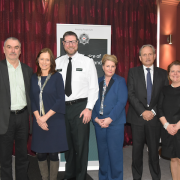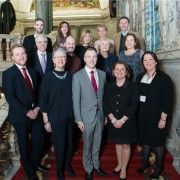Chris Maccabe CB joins CDPB’s Board of Directors
We are delighted to announce the appointment of Chris Maccabe CB to the Board of Directors of the Centre for Democracy and Peace Building. Mr Macabe is joining Lord Alderdice, Rt Hon Jeffrey Donaldosn MP, Liam Maskey and Professor Deirdre Heenan.
Chris Maccabe served as a private secretary to the Chief Minister of Northern Ireland, Brian Faulkner, during the short-lived power sharing Executive in 1974; and as a private secretary to the Deputy Secretary of State for Northern Ireland from 1975 to 1977.
Between 1980 and 1984 he was a special assistant to the Chief Constable of the Royal Ulster Constabulary, Sir John Hermon; and from 1988 to 1991 Director of Regimes in the Northern Ireland Prison Service.
In 1992 he was appointed head of the Political Affairs Division in the Northern Ireland Office, and subsequently Political Director of the NIO (an appointment coupled with the role of British Joint Secretary of the British-Irish Intergovernmental Conference). From then until his retirement from the NIO in 2008 he was deeply involved in the negotiations leading up to the Good Friday Agreement and beyond, and in discussions with the associates of various paramilitary groups. Since 2006 he has given advice to the governments of Sri Lanka, Kosovo, Tanzania and elsewhere on peace processes and political development.
He is currently a member of the International Verification Commission monitoring ETA’s ceasefire in Spain; the Minister of Justice’s representative on the team assessing the Minister’s 2010 agreement with dissident Republican prisoners in Maghaberry Prison; Chair of Belfast Conflict Resolution Consortium; a director of Forum for Cities in Transition (Belfast) Ltd; and a governor (and former Chairman) of Victoria College Belfast.
Chris holds bachelors and masters degrees in law from Queen’s University and the University of London. He is an Honorary Fellow of the Institute of Irish Studies at Liverpool University, and a Fellow of the Royal Society of Arts. In 2004 he was appointed a Companion of the Most Honourable Order of the Bath in the Queen’s Birthday Honours.
PSNI’s first multi-agency seminar to tackle hate crime
The Police Service of Northern Ireland hosted their first multi-agency hate crime seminar to illustrate and share practice about the range of work being been done to address hate crime issues across Northern Ireland.
ACC Stephen Martin, who is the organisational lead for hate crime, opened the event held at Newforge.
He said; “In 2014, following a rise in the incidence of hate crime the PSNI launched a range of operational measures to deal more effectively with what is a very serious issue. Because the victims are in a minority, the impact of these crimes is much more keenly felt, can be long lasting and has a much wider resonance than just with the victim and their immediate family. Hate Crime is a strategic priority for PSNI and I am extremely encouraged by the commitment of our partner agencies who work so hard with us to tackle prejudice and ignorance in our society. I truly believe that there is more confidence now for members of the public to report these incidents to police.
He continued; “However, we must not be complacent. We all recognise that there is still so much to do to confront hate crime and it is vital we continue to work closely with our partners and voluntary sector organisations. Collectively we need to send a strong message that Hate Crime is not acceptable, and where it occurs, seek to catch those responsible and place them before the courts.”
Following the opening address Denise Wright, Race Relations Manager from South Belfast Roundtable and former PSNI Assistant Chief Constable Jonathan McIvor took to the stage to discuss working with the Syrian refugees.
Jonathan McIvor, who is Director of Siren Associates said; “For over two years former PSNI officers, as part of a British Embassy funded project implemented by Siren Associates, a Northern Ireland not for profit organisation, have been working to create safe and secure environments for Syrian Refugees in camps in Jordan in partnership with International Organisations. The process of integrating vulnerable Syrian Refugees into our communities here will require understanding, generosity and a commitment to valuing diversity. Some of the learning from that experience is helping to inform the process of receiving refugees into Northern Ireland.”
Kerry Malone, Probation Board NI Area Manager, said “PBNI value the ongoing multi-agency partnership working and welcome the opportunity to present at the Hate Crime Seminar. PBNI address all aspects of abusive behaviours outlined under hate crime legislation through the provision of professional analysis in pre-sentence assessment and evidence based, effective intervention during supervision. PBNI are committed to changing lives for safer communities”.
Jolena Flett from the Migrant Centre NI spoke about the hate crime advocacy services and said; “We are encouraged by events like this that give the community and the PSNI the opportunity to come together and share learning and improve services to victims.”
Eva Grosman, CEO Centre for Democracy and Peace Building and co-founder of Unite Against Hate campaign added; “The Unite Against Hate campaign aims to raise awareness of hate crime among the general public, address under-reporting of hate crime and promote the benefits of diversity among people in Northern Ireland. Our work would not be possible without the ongoing support from the key partners, including the PSNI. The Police Service was the main driver behind the original UAH campaign and continues to lead the way in addressing and improving response to hate crime across NI.”
ACC Martin concluded; “I remain convinced that hate crime will only be resolved with a co-ordinated, multi-agency approach. Together with our partner agencies we will continue to work closely and engage with our most vulnerable communities, increase confidence and ensure that Northern Ireland is a welcoming place for those who are forced to flee their homes. We would ask the community to assist us in that effort.”
Music Unite in Ballymena
The Ballykeel Loyal Sons of Ulster band are to perform at the Ballymena Showgrounds as part of the ‘Music Unite’ programme on 23th March 2016.
Music Unite is a joint project between the Centre for Democracy and Peace Building and Beyond Skin and supported by OFMDFM. The Ballymena event has been developed in partnership with the Ballymena Inter Ethnic Forum.
Music Unite provides an opportunity for band members and musicians from different cultures to develop relationships, celebrate identity and perform together as well as to challenge stereotypes that are associated with Loyalist bands.
The Music Unite Ballymena project builds on a very successful pilot programme with the Shankill Road Defenders (SRD) Flute Band.
A public event will take place on 23rd March at 7.30pm at Des Allen Suite, Ballymena Showgrounds. The Ballykeel Loyal Sons of Ulster band will be joined by the Shankill Road Defenders and artists from Slovakia and Ghana and a special guest from Columbia.
You are welcome to join us to celebrate diversity and bringing people together through their love of music.
Light refreshments will be provided.

Leadership Academy: Hate Crime and Community Policing
The Leadership Academy has been developed by the Centre for Democracy and Peace Building and the Institute of Irish Studies, University of Liverpool. It shares the knowledge and experience of conflict and conflict transformation in Northern Ireland and beyond, and its relation to dissent and risk in contemporary British society.
By India Fahy
On Tuesday we hosted the second of our Leadership Academy sessions, this time focused on Hate Crime and Community Policing.
 It was a pleasure to hear the insights of Assistant Chief Constable Stephen Martin, who discussed at length the importance, particularly in NI, of police building their cultural competencies and being constantly alert to the nuances of everything they say and do. This messaged was reiterated by Paul Giassani who highlighted the overlap with the PSNI and the Police Service in England and Wales and stressed that hostility exists in every society, the willingness of the state to deal with it is considered to be a key indicator of a thriving society.
It was a pleasure to hear the insights of Assistant Chief Constable Stephen Martin, who discussed at length the importance, particularly in NI, of police building their cultural competencies and being constantly alert to the nuances of everything they say and do. This messaged was reiterated by Paul Giassani who highlighted the overlap with the PSNI and the Police Service in England and Wales and stressed that hostility exists in every society, the willingness of the state to deal with it is considered to be a key indicator of a thriving society.
One message that I took away was the notion that a business can never be successful without understanding its clients’ and their needs and wants. It seems that there has been a drive within the police force to adopt a more ‘client-centric’ approach, seeking to understand the communities they police. ACC Martin made the point that it would be nonsensical to arrive at the house of a Catholic family in Derry/Londonderry to deal with a domestic violence issue and refer to the city as Londonderry. This is certainly a welcome development.
ACC Martin stressed that the response of police officers to hate crime is critical; until officers begin to identify with victims of hatred and truly appreciate the fear and isolation it can create, he believes that we will always be one step behind – policies and other measures will not resolve the problem. On a more somber note ACC Martin stressed that as Northern Ireland moves beyond ‘The Troubles’ he can’t help but wonder if we are starting to displace traditional sectarian hostility with hostility based on difference by ethnicity, other religions, or sexuality.
This fear was certainly corroborated in some respects by the quantitative research study presented by Professor Peter Shirlow. Professor Shirlow provided a fascinating insight into the role of ‘signals’, particularly in a post-conflict society like Northern Ireland, in influencing perceptions of crime. He provided the comparison of a young man wearing a celtic or rangers shirt attacked at a bus stop, and a young man in plain clothing being attacked in the same circumstances. He stressed that because of our identification we can perceive that an attack with a ‘signal’ is an attack on ‘us’ and our community. Professor Shirlow’s study on perceptions of crime surveyed 990 families in Belfast interface areas about how common they believed that sectarian and ordinary crimes are in their communities. Whilst the level of recorded sectarian crimes across the wards ranged fro 1% – 7%, perceived levels of sectarian crime ranged from 23% to 55%. The study also revealed that perceived sectarian crime was the biggest indicator of a negative attitude towards the police.
A personal highlight of this week’s leadership academy was the attendance by two members of the police force of Somalia. Somalia is now emerging from conflict after 27 years and the challenge that the police force are facing is immense, in particular challenges from extremist organisations are proving extremely difficult to assuage. The two officers attended the Leadership Academy hoping to gain an understanding of how they can move forward and gain the confidence of their community. Both ACC Martin and Paul Giassani provided practical and innovative advice based on their experience of building relationships and rebuilding some semblance of unity.
This is just a snippet of the lessons that emerged from this Leadership Academy session. Deirdre, Stephen, Peter and Paul spoke eloquently about their own experience and advice moving forward. It is evident that remnants of the problems of the past still linger in Northern Ireland, and that we are likely to face a host of new issues. What matters going forward is that we have clear and concise strategies moving forward which are executed as sensitively as possible.
The next Leadership Academy on ‘Social Media as a Driver of Conflict/Conflict Transformation’ will take place at the University of Liverpool’s London Campus on Wednesday 23rd March 2016 at 2.30pm.
University of Liverpool’s London Campus on Tuesday 23rd February 2016 at 2.30pm
Sign up here: www.getinvited.to/cdpb/leadership/
Leadership Academy: Engaging with Communities at Risk
By India Fahy
The Leadership Academy has been developed by the Centre for Democracy and Peace Building and the Institute of Irish Studies, University of Liverpool. It shares the knowledge and experience of conflict and conflict transformation in Northern Ireland and beyond, and its relation to dissent and risk in contemporary British society.
The first session, ‘Engaging with Communities at Risk’, took place on 26th January. At the heart of the focus of the session was an examination of the role and impact of leadership in public service. I left the session feeling enlightened and with a revived interest in the study of Northern Ireland.
I had never before even considered the role played by the Northern Ireland Housing Executive in creating a peaceful and fair society. Jennifer Hawthorne, Head of Communities for the NIHE, led a fascinating session on ‘Building Peace through Housing’, giving an overview of the work that the HE is involved in within interface communities and some of the hardest hit areas of NI. The work carried out by the Community Cohesion team is focused on building better relations, ensuring that communities are safe and welcome to all, and strengthening cohesive communities.
One specific element of the projects carried out resonated with me, it seemed clear that the emphasis of the projects is placed on a careful process and impact, rather than tokenistic sentiments. The re-imaging programme works directly with communities, ensuring that they are fully involved from the project’s inception, giving a real sense of ownership and pride from the outset. Emotive examples have included new artwork featuring images close to the communities’ heart, such as a Mandela anti-racism mural created in Woodbourne.
Professor Shirlow made another interesting observation, about the fact that we often forget that there is a peace process worthy of study and consideration right on our doorstep. He highlighted that many conflict theorists are guilty of looking to former conflict regions further afield, such as the former Yugoslavia, before considering Northern Ireland. After the session I had a conversation with another WIP alum which shed further light on this matter, in-fact she had travelled to Yugoslavia with a view to studying the peace process there. As a resident of the Republic of Ireland she had never considered that a peace process worthy of study existed just across the border.
These were just two lessons that I took away from the dynamic and comprehensive Leadership Academy session led by Professor Peter Shirlow, Debbie Waters and Jennifer Hawthorne. It is just this type of realisation that is the very purpose of the Academy itself, the Academy is intended to raise awareness and understanding, and capture the experiences of the many processes at work in Northern Ireland’s ongoing peace process. I came away from the session with a refreshed interest in such matters and a desire to expand my knowledge further.
The next session ‘Hate Crime and Community Policing’ on 23rd February will look at the evidence on hate crime and its impact on community/policing relationships and the policies adopted to challenge the reproduction of hate crime and its destabilising effect.
University of Liverpool’s London Campus on Tuesday 23rd February 2016 at 2.30pm
Sign up here: www.getinvited.to/cdpb/leadership/
First EU Debate NI event launched in Belfast City Hall
The first EU Debate NI event was launched in Belfast City Hall by Deputy Lord Mayor Alderman Guy Spence on Friday, 5 February. It brought together representatives from across business, public and community sectors to discuss the issues that need to be considered in Northern Ireland in relation to the upcoming UK referendum on continued EU membership.
EU Debate NI is a programme of the Centre for Democracy and Peace Building (CDPB). CDPB are taking a neutral position in this debate, seeking to stimulate and inform debate on the issues in this referendum.
Conor Houston, Programme Director at CDPB commented following the event that “it was a lively, engaging and interactive event. We had round table discussions together with interactive polling allowed for diverse opinions and a range of views to be debated – including issues around trade, cross-border, immigration, effect on peace-funding and many other topics.”






